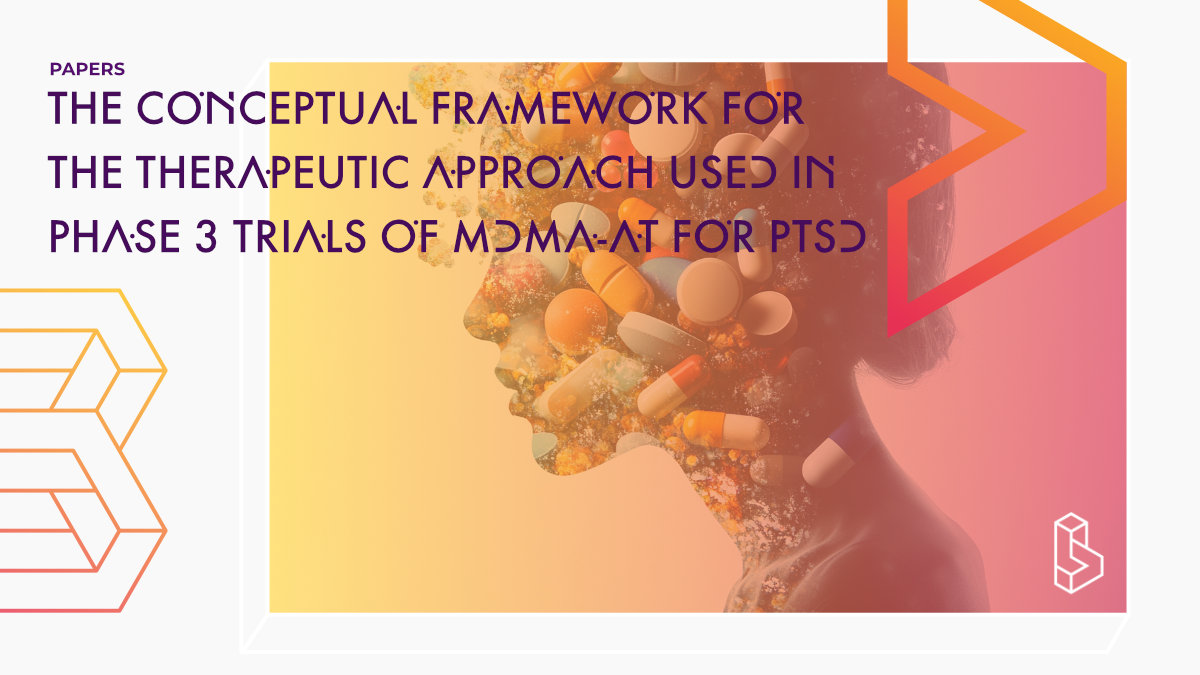This theoretical framework paper analyzes two Phase III trials of MDMA-assisted therapy for PTSD, describing the conceptual underpinnings and therapeutic approach. It explains how the treatment combines three MDMA-facilitated sessions with non-drug psychotherapy sessions, emphasizing the patient’s “inner healing intelligence” as the primary change agent and the therapeutic relationship as the core facilitating condition.
Abstract of The conceptual framework for the therapeutic approach used in phase 3 trials of MDMA-assisted therapy for PTSD
“Results from multiple recent studies support further evaluation of 3,4-methylenedioxymethamphetamine (MDMA) in conjunction with psychotherapy (i.e., MDMA-Assisted Therapy) in the treatment of post-traumatic stress disorder (PTSD). In two Phase 3 trials, MDMA-Assisted Therapy comprised a short-term, intensive psychotherapy that included three sessions directly facilitated by MDMA (referred to as “experimental sessions”), as well as a number of non-drug psychotherapy sessions. This treatment model aimed to harness the potential of MDMA to facilitate recall and processing of traumatic memories, and to increase learning in a social context, integrating “top-down” and “bottom-up” approaches to trauma-focused care. To date, the conceptual framework for this treatment has not been described in the scientific literature. This omission has contributed to misunderstandings about both the theoretical underpinnings of this modality and the therapeutic approach that emerges from it. This paper delineates the psychotherapeutic concepts, theories, and historical antecedents underlying the inner-directed approach to MDMA-Assisted Therapy for PTSD. Broadly speaking, this therapeutic framework centered the concept of the participant’s inner healing intelligence as the primary agent of change, with the therapeutic relationship being the core facilitative condition fostering the participant’s self-directed movement toward recovery and growth. Corollaries to this holistic, self-directed, relational, and trauma-informed framework include a non-pathologizing approach to the participant’s embodied experience (including the possibility of intense emotional and somatic expression, experiences of multiplicity, suicidal ideation, and multigenerational and transpersonal experiences), as well as the therapists’ own psychodynamic, somatic, and transpersonal awareness, empathic attunement, relational skillfulness, and cultural humility. The use of MDMA in conjunction with this psychotherapy platform outperformed the use of placebo with psychotherapy in Phase 2 and 3 trials, as measured by symptom reduction in participants with PTSD. However, within-group comparisons also identified significant symptom reduction in participants who did not receive MDMA, lending empirical support to the psychotherapy model itself. In addition to comparative efficacy trials, future research should investigate which elements of the conceptual framework and therapeutic approach underlie the clinical benefit in individuals with PTSD.”
Authors: Kelley C. O’Donnell, Lauren Okano, Michael Alpert, Christopher R. Nicholas, Chantelle Thomas, Bruce Poulter, Ann T. Mithoefer, Michael C. Mithoefer & Marcela Ot’alora G.
Summary of The conceptual framework for the therapeutic approach used in phase 3 trials of MDMA-assisted therapy for PTSD
The study explores the conceptual framework used in Phase 3 trials of MDMA-assisted therapy for post-traumatic stress disorder (PTSD). Previous research has shown significant symptom reduction in individuals undergoing this therapy, surpassing outcomes from standard therapies like cognitive processing therapy. The Phase 3 trials demonstrated high efficacy, with MDMA paired with psychotherapy yielding robust results compared to placebo psychotherapy.
Key to this framework is the belief in a participant’s “inner healing intelligence”—a self-directed ability to heal when provided with supportive conditions. This theoretical approach integrates trauma-informed care, relational ethics, and cultural humility. The researchers stress the need to articulate this framework to clarify misunderstandings about its methodologies and underline its empirical basis.
Conceptual Framework
Inner Healing Intelligence
Find this paper
https://doi.org/10.3389/fpsyg.2024.1427531
Open Access | Google Scholar | Backup | 🕊
Cite this paper (APA)
O’Donnell, K. C., Okano, L., Alpert, M., Nicholas, C. R., Thomas, C., Poulter, B., ... & Ot’alora G, M. (2024). The conceptual framework for the therapeutic approach used in phase 3 trials of MDMA-assisted therapy for PTSD. Frontiers in Psychology, 15, 1427531.
Linked Research Papers
Notable research papers that build on or are influenced by this paper
MDMA-assisted therapy for severe PTSD: a randomized, double-blind, placebo-controlled phase 3 studyThis double-blind, placebo-controlled study (n=90) finds that MDMA-assisted therapy (3x 80-120mg) is effective (d=.91, large effect size) in the treatment of PTSD. 67% of those in the MDMA-group no longer qualified for PTSD (vs 32% for the therapy-only group). This study is part of the Phase III trial to get MDMA approved by the FDA.
MDMA-assisted therapy for moderate to severe PTSD: a randomized, placebo-controlled phase 3 trial
This multi-site, randomized, double-blind, Phase IIIb trial (n=104) evaluated the efficacy and safety of MDMA-assisted therapy (MDMA-AT) for individuals with moderate to severe PTSD. The study found significant reductions in PTSD severity (CAPS-5 score) and functional impairment (SDS score) for the MDMA-AT group compared to placebo with therapy. Seven participants experienced severe treatment-emergent adverse events, but no deaths or serious adverse events were reported. The treatment was found to be generally well tolerated in a diverse population.

